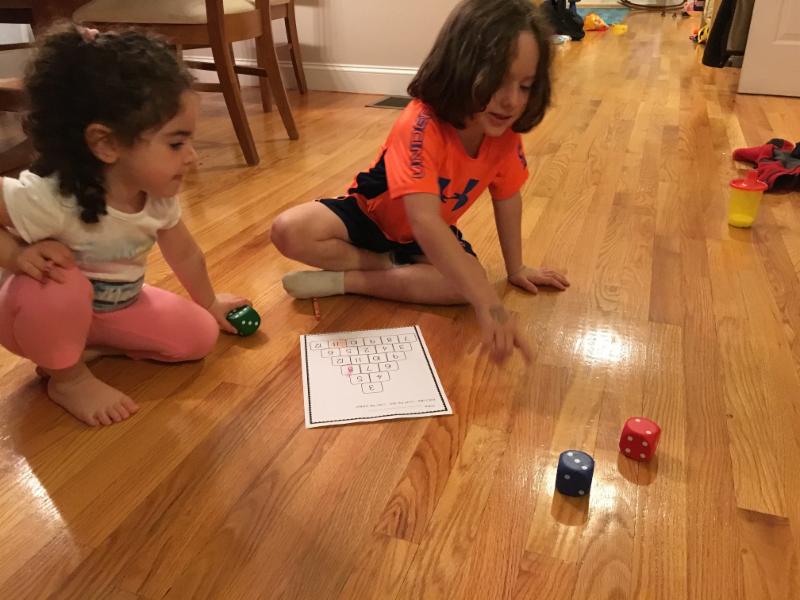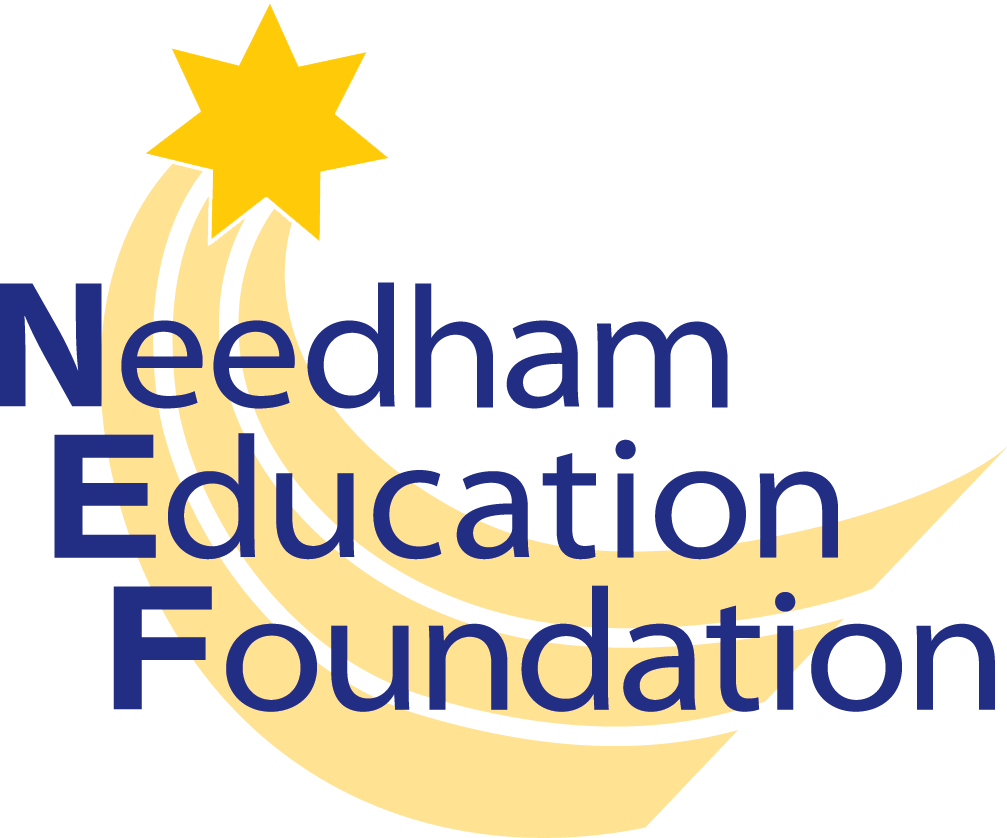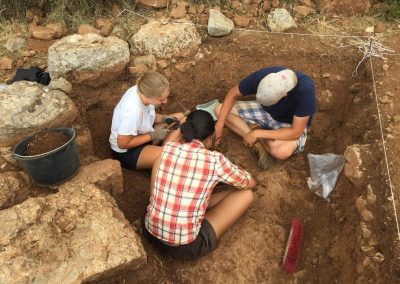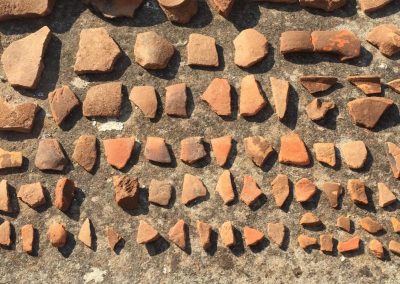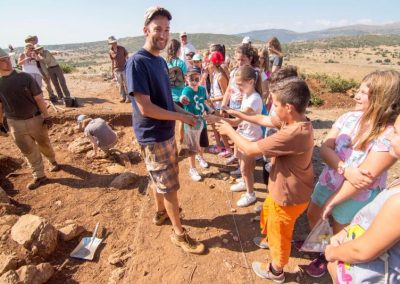Archaeological Dig in Greece
Stephen Guerriero, a social studies teacher at High Rock, was awarded a grant from the NEF to participate in an archaeological dig in Phocis, Greece over the summer. He will incorporate much of what he learned into High Rock’s archaeology curriculum in the coming year.
He shared his experiences with the NEF:
“I am so happy to share with you some of my experiences that I had this summer as a participant and trench supervisor at the Kastrouli-Desfina Field School and Excavation.
The Kastrouli archaeological site consists of a large, terraced hilltop outside of the small village of Desfina in the region of Phocis, Greece. I arrived in Desfina, Greece at the beginning of July and stayed just about four weeks. The 2018 season’s main goal was to uncover areas of use around a large, exposed wall from the Late Mycenaean period.
I worked as a trench supervisor for one of the three trenches that we opened in Kastrouli. The days consisted of a 5:30 AM wake up, quick coffee, and then up to the dig site. Each morning, a shepherd walked his flock of goats by our site on their way to graze. Our terrace overlooked the entire valley below. The soil in Greece is dry, dusty, and hard-packed. My team worked to uncover several foundation walls, discovered pottery sherds dating from between the Late Bronze Age to the early Iron Age (1300 – 1000 BCE). We also discovered fragments of human remains and animal remains, as well as fire pits, plaster, and evidence of massive destruction. We stopped our digging for a “drone break” at 11:00 AM At this time, Ian Roy, the head of the Brandeis University MakerLab, would fly his high-powered drone overhead and photograph the entire site. Each day, his photogrammetry runs would generate hundreds of images and gigabytes of data. These images were used to generate both 3-D models of the site, and to put together time-lapse animations of each trench’s progress. The overhead images were especially important in analyzing the site and planning each day’s digging.
By 1:30 PM, we finished digging for the day because the summer sun in Greece is intense, and temperatures were often over 90ºF. After lunch, we washed, photographed, and “read” the pottery found that day. This means we were able to make preliminary judgments about the context, dating, and usage of the site based upon the pottery sherds we were finding. Later, we attended lectures and seminars from faculty members of Brandeis, Wesleyan, and the University of the Aegean. These included talks and workshops about the Bronze Age collapse, pottery reading, conservation, local History, advanced archaeological methods. We also traveled throughout the regions of Phocis and Boetia to see similar sites of occupation, visit museums, and have a guided tour throughout the famous archaeological park of Delphi, which includes the Sanctuary of Apollo, the home of the oracle.
My work has been to document my experiences for my students and colleagues, to bring back the latest in archaeological field methods and practices, and to see first-hand the newest technology in use. I’m so excited to share all of this with my students, especially the drone-based photogrammetry, 3-D imagery, 3-D printing of artifacts, and the use of GPS satellites. I know my kids will have a more dynamic, interactive, and richer learning experience because of the NEF’s support!”
Science Center’s StarLab Makes Debut at Let’s Build Event
Good things come to those who wait! The NEF was pleased to provide funding to the NPS Science Center to purchase a StarLab portable planetarium through a $15,000 grant in our 2015 large grant cycle. It took a while longer than anticipated, but the StarLab was up and running at last week’s 5th Annual Engineering Extravaganza put on by another former NEF grant recipient, Let’s Build, at Broadmeadow School.
During the event, three groups of approximately 24 eager children and parents crawled into the large black dome where day was transformed to night, and all of the stars were on display. The tour through our solar system was guided by grant writer Elise Morgan and other Science Center staff. Once all of the questions were exhausted, participants also got a peek at a second projection cylinder which showed all of the constellations floating across the night sky.
“The Science Center,” Morgan wrote in her grant request, “strives to … provide curriculum which educates, inspires and promotes deep and comprehensive scientific knowledge to support NPS students’ academic futures and by extension, the future of the world in which we live.” The StarLab will eventually be integrated into the curriculum in all elementary grades. Who knows how many future scientists it may inspire?
See coverage of the grant award on the Needham Channel.
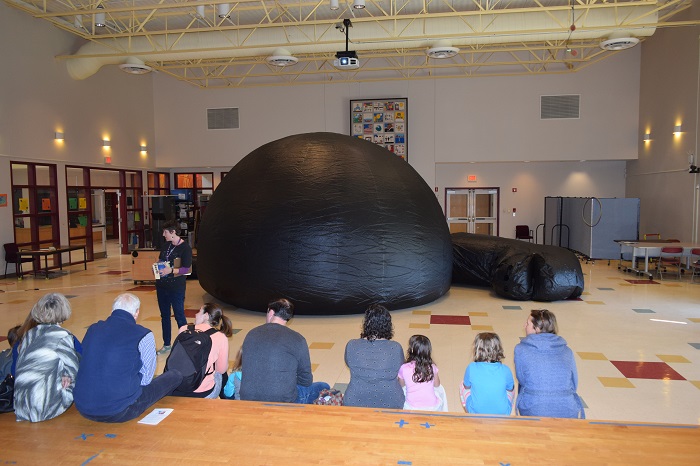
Ukuleles at Eliot
Earlier this year, George Vallatini, music teacher at Eliot Elementary School, started implementing the use of ukuleles into his music classrooms. This all-grade-level program was created to provide a richer musical experience for every student at Eliot.
The grant request was for 30 soprano ukuleles and a coordinating music stand for storing them when not in use. The soprano ukuleles are the ideal size for children in grades K through 5.
“There are no string instruments like ukuleles and guitars for the elementary students to use. While the guitar is a difficult instrument for young children to play, the easier ukulele brings an entirely new way for our students to experience the music curriculum. Additionally, the current rise in the popularity of the ukulele brings a fresh and exciting dimension to the musical experience of our Eliot school students,” says Vallatini.
The students are using the ukuleles to accompany their singing, like the folk singers Joni Mitchell and Pete Seeger. They are using the instruments to learn about songs and melody and harmony, as well as rhythm and song structure. The students will also use the ukuleles to help them compose their own original music.
“The ukuleles allow me to teach music in a new and inspiring way,” says Vallatini. Traditionally, when the students are asked to sing, they sing either acapella or accompanied by the piano. By incorporating the ukulele into the existing curriculum, students accompany themselves. According to Vallatini, “This allows them to learn about harmony and accompaniment in a practical, hands-on way.”
The program was funded by a grant from the NEF’s Fall 2017 Small Grants cycle.
Click here to see an Eliot Kindergarten class using a few of the ukuleles.
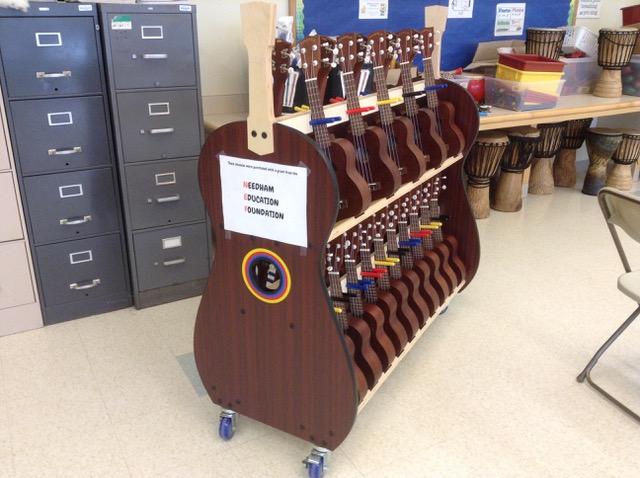
Virtual Reality at Needham High School
Samantha Bookston, Technology Integration Specialist at Needham High School, was awarded a grant of $4,700 in the Fall of 2016 for virtual reality teaching equipment. Here she tells us how this new technology has been used in classrooms to enhance learning across disciplines.
Many of us are new to VR. How exactly does it work?
Virtual reality is a computer-created scenario that mimics a real experience. Last year, the NEF awarded the high school a grant for a virtual reality cart, which includes 30 plastic (cleanable!) viewers, 13 cell phone devices, 1 teacher tablet, 1 router, 1 360 degree camera, and a cart. This allows teachers to easily use the cart for a classroom of students.
Can you tell us about projects this equipment has been used for?
The cart has been widely used across multiple departments, with most teachers using the cart for Google Expeditions. During this type of lesson, a teacher will use the tablet to lead students on an experience related to what they are currently studying. For example, a psychology class is able to go on an expedition that explores different parts of the brain–where they are located within relation to one another, and what they look like up close as the brain is working. A social studies class went on an expedition to the trenches of World War I and were able to put themselves in the trench and look around, making observations on what it would have been like in this small area for a length of time. In this particular expedition, they were able to hear warfare sounds as well. Expeditions is a free app that comes with about 8 panoramic slides per expedition; on each of these slides is a 360 image (some include pictures and audio), text to give context to the image, and key things to point out.
How is VR equipment better than, say, a tablet or Chromebook?
While students can use tablets, Chromebooks, or other online resources for making connections, the VR cart allows the students to experience and make their own observations because they are placed within the picture or video. The first time a classroom puts on the goggles, there are typically a lot of wows, oohs and aahs!
How have the students and teachers reacted to VR?
Teachers are really excited about the VR cart. It has been set up to be easily integrated in the classroom as an enhancement. Some teachers have gone a little farther and have done projects where the students create the virtual reality experience themselves. The students used the 360 camera to shoot a scenario for wellness class, and then they edited it to use as a teaching video for their classmates. A world language class studied different French-speaking countries and edited 360 images together with their voices to create cultural videos. They then used these videos to learn about different cities.
As virtual reality is becoming more popular, we are excited to expose our students to it. They are making connections using multiple senses and are learning how this new technology and kind of experience can make an impact.
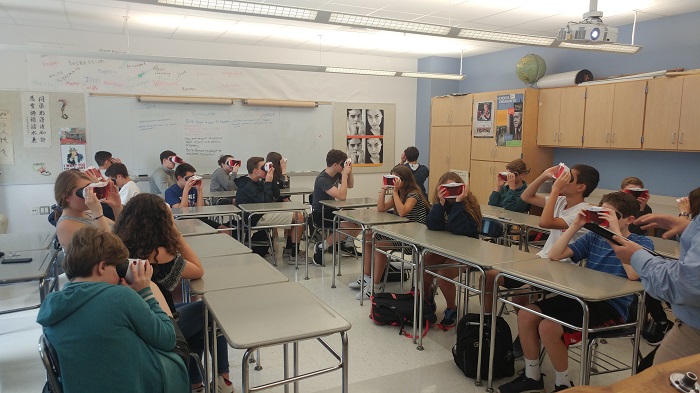
NHS Experiences ‘One Day’ Author Panel
By Laura Drinan
Hometown Weekly Reporter
Reprinted from the Hometown Weekly, February 8, 2018
Have you ever finished a book that just left you so astounded and inspired to write your own novel?
It has certainly happened to some of the students at Needham High School.
For their half-day schedule on January 31, Needham High students participated in the “One Day” experience, with this year’s theme revolving around developing authentic characters. Who would have been better to ask about authentic characters than three accomplished authors from eastern Massachusetts? The students selected workshops that would be most beneficial to their growth as writers for the school-wide event. To advise the students by sharing their personal writing experiences, local authors Diana Renn, Marjan Kamali, and Tara Sullivan served on a panel in the library’s media center.
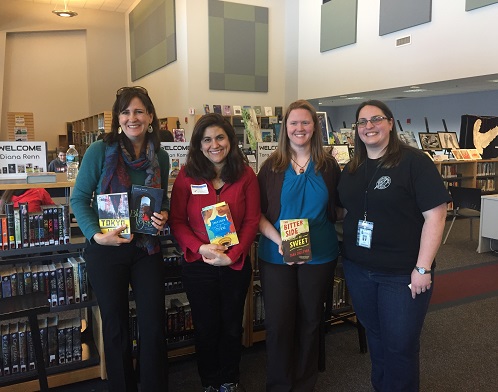
Spheros Bring Excitement to Learning
Last Spring, the Technology Integration Specialists at each elementary school collaborated on a grant to bring Spheros to the elementary schools and were awarded $10,000 from the NEF. What exactly are Spheros? They are robotic balls, about four inches in diameter, that can be programmed to do cool things using an iPad or Chromebook. The visual, block-based program makes learning the basic principles of programming approachable and fun for kids. Among other tricks, Spheros can change colors, run a circuit, and keep beat with a song.
The Tech Specialists have collaborated on introductory lessons that have allowed kids and teachers to become acquainted with these little robots. Using the Draw tool, Drive tool, and some simple programming of shapes, kids have: drawn shapes by hand on screen for the Sphero to repeat; used markers, large easel paper, and a see-through plastic cup to drive Spheros and create scribble art; grades 3-5 programmed Spheros to make spirals, figure 8s and other shapes; students in 4th grade “drove” their Spheros along a story map during Media.
As the children get more adept at using the Spheros, the tricks and programming can become more advanced. For example, they’ll be able to show their knowledge of geometry by programming angles to draw specific 2-D shapes. They will also be able to program the Spheros to solve more complicated mathematical questions, for example, measuring how speed and time will affect distance.
Kara Shea, a 3rd grade teacher at Hillside, says her class absolutely loves learning with the Spheros, and that they are an excellent tool for hands-on, project-based learning. Maria DeCicco, Tech Specialist at Hillside, said the Spheros have created a lot of excitement in classes across all grade levels. They have been such a success, says DeCicco, that she knows of three students who put Spheros on their holiday wish list. As one 3rd grader said, “They are really fun. They are the coolest thing in my life!”
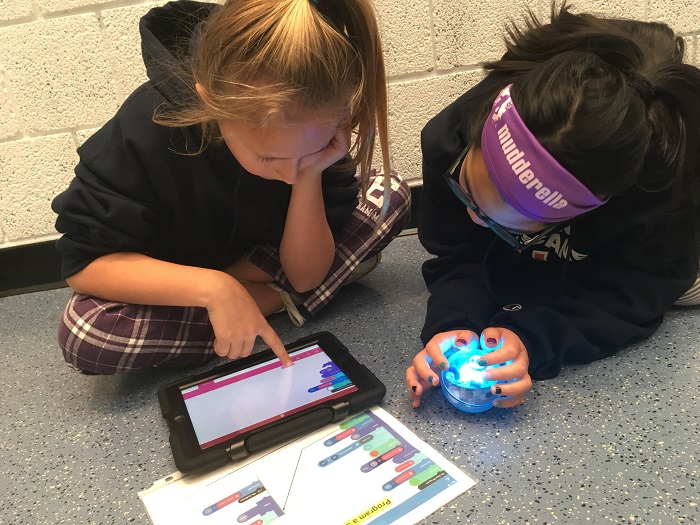
Author Jerry Pallotta Visits Hillside
Hillside kindergarten and first grade students could not contain their giggles in response to Jerry Pallotta’s audiovisual antics on a recent Thursday morning. Pallotta is a former Needham native and the author of the Who Would Win? series along with multiple alphabet and math themed books. He was invited to Hillside to make three presentations explaining the steps that go into writing non-fiction books and showing how much fun writing and reading non-fiction can be.
Pallotta’s day-long visit was funded by a grant from the NEF’s Spring 2017 Small Grants Cycle. Hillside parent Seema Meloni authored the grant with the support of school-based partners Liz Hitron, Hillside librarian, and Sena Hsu, 4th grade teacher. Their application pointed to recent research and changing Common Core standards that require elementary teachers to increase the amount of reading time that is focused on non-fiction texts to 50%. “It’s often challenging to find ways to excite students to focus on non-fiction texts,” Meloni wrote. This visit was envisioned to be a creative and innovative way to spark children’s interests and encourage them to spend more of their independent reading time on non-fiction materials.
“I loved that he showed students his writing drafts and work-in-progress to show that writing truly is a process,” Sena Hsu pointed out, “He also shared some titles and ideas of books that never got published. It’s so important for kids to realize that even adults try and don’t always succeed and that’s ok. That’s how we learn and grow. What great Growth Mindset moments!”
Jacob Peters, 4th grader, summed up the visit: “Jerry Palotta is a very bright and kind person. He is an awesome author, too.”
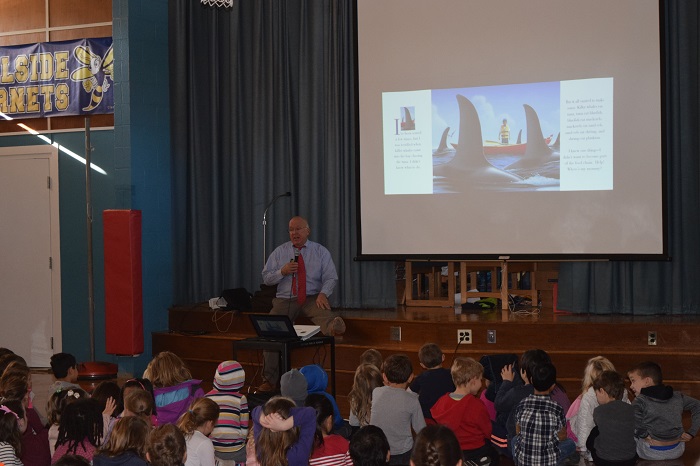
Race to Nowhere: Film and Panel Discussion
Nearly 200 parents, teachers, administrators and community members filled the Pollard auditorium on October 19th to watch a screening of Race to Nowhere. The film, which was funded by a NEF grant, examines the culture of over-scheduling, over-testing and over-pressuring children. It “reveals an education system in which cheating has become commonplace; students have become disengaged; stress-related illness, depression and burnout are rampant; and young people arrive at college and the workplace unprepared and uninspired.”
The film was introduced by Tamatha Bibbo, Principal at Pollard Middle School, who said that the new STRETCH Block is one way Pollard is trying to take some pressure off of kids during the school day. STRETCH classes meet for 6 weeks, twice a week, for 30 minutes each, and offer students the opportunity to “stretch their skills and competencies through enriching activities, and explore interests without the pressure of homework or assessments.”
After the film concluded, a panel of four educators took questions. Parents were curious what the Needham Public Schools are doing to address the issues presented in the film—especially considering it was released in 2010. Michael Goodin, Founder of the Rivers and Revolutions Program at Concord-Carlisle High School, reminded the audience that “seven years is just a blip in the education system. It’s going to take years and years to change things.” Lisa Fiore, Professor of Developmental and Educational Psychology at Lesley University, recommended that parents attend school committee meetings to let their concerns be known.
All agreed that professional development is one key to exploring the topics that were addressed in the film. Aaron Sicotte, Principal of Needham High School, said that the longer school day is enabling teachers at the high school to meet once a week.
The amount of homework was also a topic of conversation. Sicotte commented that homework is something “we’re continuing to talk about.” Parents and teachers need to consider, however, “If a child is taking six hours on homework, have we chosen the right class for him or her?”
Jimmy Odierna, Interdisciplinary Learning Specialist and Co-Founder of the Greater Boston Project at Needham High School, commented that the district is starting to focus more on growth mindset. Teachers of the Greater Boston Project have changed the rubric to include assessments on how much a student has grown and how a student has rebounded after dealing with a setback.
The pressure to achieve and attend the top colleges was a recurring theme throughout the movie. Odierna said “We, as a community, still push the top schools … Do kids need to go to an Ivy League school to be successful? Of course not.” He also stressed that NPS are focusing more on social-emotional learning and project-based learning. Sicotte added, “It’s a hard balance because we have a state and nation that has high expectations, and the town of Needham pays a lot of attention to MCAS and SAT scores.” “How do we make sure we have healthy kids?” he asked. “As parents, it’s important to know your kids and find a path that makes sense for them, and that path won’t necessarily be the one your neighbors are following.”
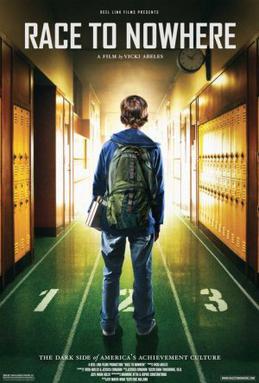
High Rock Creation Lab
Last spring, the NEF approved a small grant written by Erin Mack, High Rock’s Technology Integration Specialist, to transform the technology lab into a Creation Lab. We had a chance to sit in on a class in the Creation Lab in March, where everything that Ms. Mack envisioned in her grant application has come to life in her classroom.
Where there were once rows of computers facing a whiteboard, there are now lively work spaces defined with colorful rugs, furniture and dividers. During our visit, some students were recording in front of a green screen with plans of dropping in backgrounds suitable to their project. At one grouping of computers, two students were creating a poster together, while another group lay on the floor filming a stop motion film using their iPads, an iPad stand, and a whiteboard.
Erin never sat down while we were there – she moved from group to group and answered questions, gave instructions and ideas, and challenged students to think of new ways to accomplish their tasks. In her grant application, Erin wrote, “Imagine a room where teachers can be the facilitator and students have the autonomy to create, collaborate, and learn at different paces, showcasing their learning in various ways. The possibilities for differentiation and creativity are extensive.” Kudos to Erin on a well-conceived grant and accomplishing her vision with the High Rock Creation Lab.
Reaction from staff and students has been very positive, too!
“(I liked) the options available for students to have a choice in their final project for my course. There were designated spaces for kids to work in small groups or individually. All materials were available to help them be successful.” – HR Teacher
“I liked that you could be super creative with the stop motion.”- HR Student
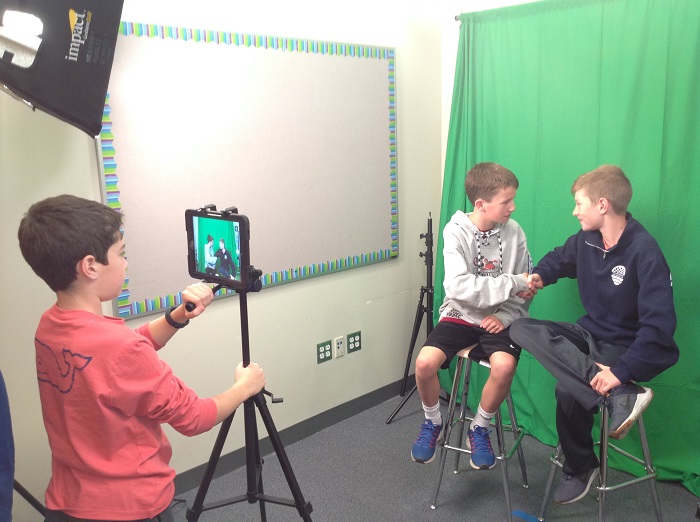
Kindergarten Math Backpacks
In Spring 2016, NEF funded a $12,000 multi-school grant for math backpacks in every kindergarten classroom across all five elementary schools. With three backpacks per classroom, students take home math-related activities they can do with their families.
Elaine McKenna, grant writer and Hillside/Eliot math coach explains the program, “The kindergarten math backpacks are a great home school connection where the students are completing math activities, playing math games, and are introduced to math literature. The math concepts are aligned with Massachusetts State Frameworks but are introduced and practiced in a fun and engaging way.”
Backpacks contain a journal for students to record their experience with the backpack, which includes books, interactive games and manipulatives. Teachers report that their students are enthusiastic about the program, “The kids really enjoy using the math backpacks. They come to school excited to tell me that they played the games with their families.” And in the words of several students,
- “I love all the games!”
- “I learned how to count by tens.”
- “The books are my favorite!”
